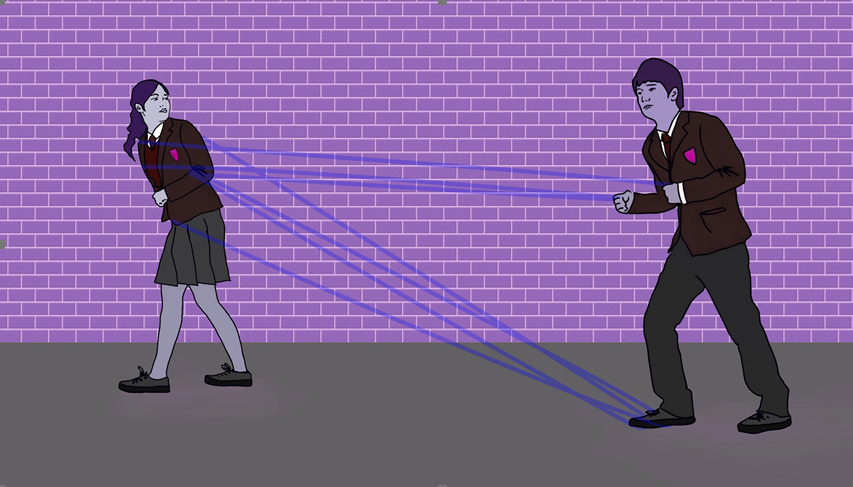"That one& #39;s a bit too revealing"
"You’re lucky I’m with you because no one else would want you."
"I could just snap your neck now, if I wanted to."
NEW: More and more teens are experiencing coercive control. I spoke to Sarah* who experienced it at 16. https://www.bbc.co.uk/bbcthree/article/f2b92a97-66d8-42b5-8d70-6a38c29b82e1">https://www.bbc.co.uk/bbcthree/...
"You’re lucky I’m with you because no one else would want you."
"I could just snap your neck now, if I wanted to."
NEW: More and more teens are experiencing coercive control. I spoke to Sarah* who experienced it at 16. https://www.bbc.co.uk/bbcthree/article/f2b92a97-66d8-42b5-8d70-6a38c29b82e1">https://www.bbc.co.uk/bbcthree/...
The difference between a healthy relationship and an abusive one isn& #39;t always obvious - especially when the lasting impact isn& #39;t as visible as a bruise - but it can be just as damaging.
So how do you know when clingy and jealous becomes controlling and coercive?
So how do you know when clingy and jealous becomes controlling and coercive?
Coercive control often can& #39;t be pinned down to one event in a relationship, but is the accumulation of words, behaviours and threats that humiliate, isolate and control the victim - until very little of & #39;themselves& #39; is left and the only & #39;normality& #39; they know is the abuser.
To raise awareness of all forms of abuse, the government made & #39;relationship education& #39; compulsory in schools - coming into action in September 2020.
The syllabus includes teaching students to identify financial, emotional and physical abuse in teenage and adult relationships.
The syllabus includes teaching students to identify financial, emotional and physical abuse in teenage and adult relationships.
Education about coercive control is something Sarah says she wishes she had access to.
"I could tell my flat mates thought [our relationship] was weird, because I was always asking him for permission, but I thought it was normal. He persuaded me it was normal."
"I could tell my flat mates thought [our relationship] was weird, because I was always asking him for permission, but I thought it was normal. He persuaded me it was normal."
Before Sarah knew it, the put-downs that stung became fears for her safety.
The time Sarah remembers most, Zach was visiting her at university. She was curled up on Zach’s chest in bed. That was when he told her, "I could just snap your neck now, if I wanted to."
The time Sarah remembers most, Zach was visiting her at university. She was curled up on Zach’s chest in bed. That was when he told her, "I could just snap your neck now, if I wanted to."
Barrister Clare Ciborowska, told me she is seeing more and more cases of coercive control involving young people aged 16 and upwards.
"When you& #39;re young nobody goes into a relationship expecting it to be abusive, but anyone can find themselves in that position."
"When you& #39;re young nobody goes into a relationship expecting it to be abusive, but anyone can find themselves in that position."
Clare says some perpetrators avoid are very manipulative so avoid physical violence because it leaves an obvious mark.
"It& #39;s much harder to be detected if it& #39;s just the coercive control aspect, even though it still has a huge adverse effect on the victim psychologically."
"It& #39;s much harder to be detected if it& #39;s just the coercive control aspect, even though it still has a huge adverse effect on the victim psychologically."
Coercive control often starts barely noticeable until the pattern of abuse escalates.
"Sometimes these little, subtle signs can start creeping in - that can happen over a long period of time.
"By that point, you& #39;re invested in the relationship when things get worse."
"Sometimes these little, subtle signs can start creeping in - that can happen over a long period of time.
"By that point, you& #39;re invested in the relationship when things get worse."
So how do you know when clingy and jealous becomes controlling and coercive? And when does that become a criminal offence? Would you be able to spot coercive control before it& #39;s too late?
Read more in my latest for @bbcthree: https://www.bbc.co.uk/bbcthree/article/f2b92a97-66d8-42b5-8d70-6a38c29b82e1">https://www.bbc.co.uk/bbcthree/...
Read more in my latest for @bbcthree: https://www.bbc.co.uk/bbcthree/article/f2b92a97-66d8-42b5-8d70-6a38c29b82e1">https://www.bbc.co.uk/bbcthree/...
Some common examples of coercive behaviour are:
■ Isolating you from friends and family
■ Depriving you of basic needs, such as food
■ Monitoring your time
■ Monitoring you via online communication tools or spyware
■ Isolating you from friends and family
■ Depriving you of basic needs, such as food
■ Monitoring your time
■ Monitoring you via online communication tools or spyware
■ Taking control over aspects of your everyday life, such as where you can go, who you can see, what you can wear and when you can sleep
■ Depriving you access to support services, such as medical services
■ Repeatedly putting you down, such as saying you& #39;re worthless
■ Depriving you access to support services, such as medical services
■ Repeatedly putting you down, such as saying you& #39;re worthless
■ Humiliating, degrading or dehumanising you
■ Controlling your finances
■ Making threats or intimidating you
■ Controlling your finances
■ Making threats or intimidating you
BBC Three doc & #39;Is This Coercive Control?& #39;, presented by @ellieflynn, is out on iPlayer now: https://www.bbc.co.uk/iplayer/episode/p08v5pwj/is-this-coercive-control">https://www.bbc.co.uk/iplayer/e...
If you think this might be you or you& #39;re upset by any of the issues raised, help and support is available. https://www.bbc.co.uk/programmes/articles/3FQFSnx6SZWsQn3TJYYlFNy/information-and-support-domestic-abuse">https://www.bbc.co.uk/programme...

 Read on Twitter
Read on Twitter


